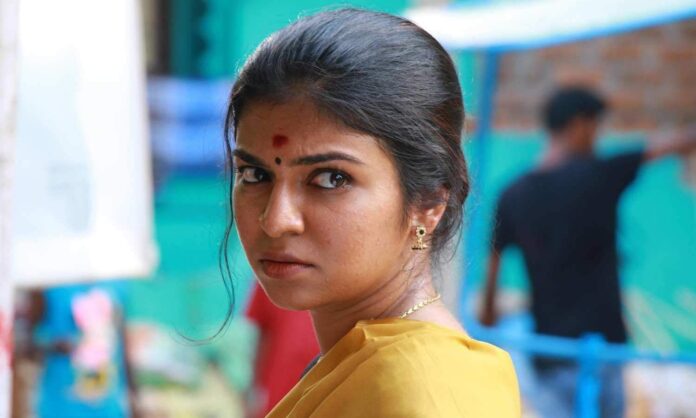Picture this. A feud has been burning between two opposing groups within the same clan. The urge to exact revenge on each other reaches an all-time peak in the third generation and a man waiting to pay back for his grandfather’s humiliation, strikes his rivals at the perfect time, only to worsen the fight between the families. Sounds familiar? Well, this age-old story is the premise of the recent drama film, Vattara Vazhakku. What does work here is Kannusamy Rajendran’s raw and rustic portrayal of Chozhavandhan from the North Madurai district. This should have ideally paved the way for a relatable tale, but the film feels terrible and its emotional core feels terribly distant due to several reasons.
Director: Kannusamy Rajendran
Cast: Santhosh Nambirajan, Raveena Ravi, Vijay Sathya
One should be ideally aware that the USP of Vattara Vazhaku is the titular lingo and culture of the district, credits to the title. But, unfortunately, the regional and old-fashioned Madurai dialect isn’t understood by all. The creators’ idea to make the urban audience familiar with the culture of the region goes in vain as the vital dialogues are lost in translation. The dubbing issues are a different problem altogether.
Though the core plot of the film is all familiar to us, it is said to be based on true incidents from the 90s. But, the film is set in the mid-80s and how do we know this? Well, kudos to the art department for their well-planned inclusion of film posters like Rasigan Oru Rasigai (1986), Savaal (1981), and Ilamai Kaalangal (1983) in the background. Aside from this, we also hear iconic songs from the 80s composed by Ilaiyarajaa, who is also the music composer of Vattara Vazhakku, playing on the radio. Though these interesting choices were enjoyable, the world-building of Vattara Vazhakku still feels wanting.
For starters, the film remains distant to us because of how unrelatable the characters are. Let’s take our lead, Sengai Maran (Santhosh Nambirajan) for example. Though we understand his hatred fuelled by the insultation of his grandfather and the following death of his grandmother we don’t quite get why he’s perenially hot-headed with raised eyebrows throughout. Be it a death stare or a romantic gaze, his expression, especially the eyebrows refuses to change. We also don’t understand his psyche or world as he randomly claims himself anti-casteist in one scene and picks up juvenile fights in the other.
Raveena Ravi is probably the only silver lining of the film, and her portrayal of the bold, loud-mouthed Thotichi is refreshing. She plays an independent teacher, training the elderly and thankfully, she makes her own decisions in the film. Her sincere rendition of the character makes the love portions of the film engaging, although the track finds a very frustrating end. Even though the pathos is in the place for a reason it is not well justified. Presenting her as a daring woman all throughout, but making her take an unwise decision to safeguard her ‘maanam‘ feels bizarre. Even a wonderful Raveena cannot salvage this end that nobody saw coming.
But Vattara Vazhakku is not an outrightly bad film. Even with a familiar storyline, the screenplay occasionally surprises with twists and turns that we would seldom expect. Though the play around the ‘Who Kills Who’ in the script is interesting, there are overlong scenes focussing on the teases of the rival gangs and the bland love episode of Thotichi and Sengai Maran. These parts made me empathize with a mentally challenged character in the film, who is mostly clueless and uneasy about the happenings in the film.
Illaiyarajaa’s music for the film, which is expected to be the cherry on top, is only par for the course. Probably to satisfy the tragic end, the film is overloaded with violence and bloodshed that makes us uncomfortable. So what is the takeaway Vattara Vazhakku offers us? Probably, a crash course on the culture and lingo of Chozhavandhan.
#Raw #portrayalisnt #save #emotionally #distant #revenge #Cinema #express

